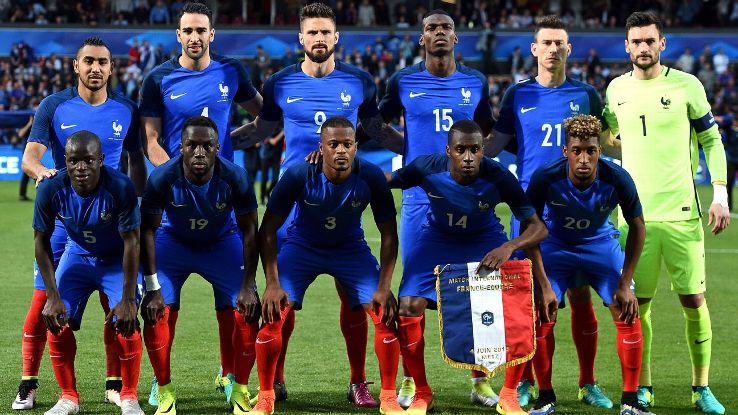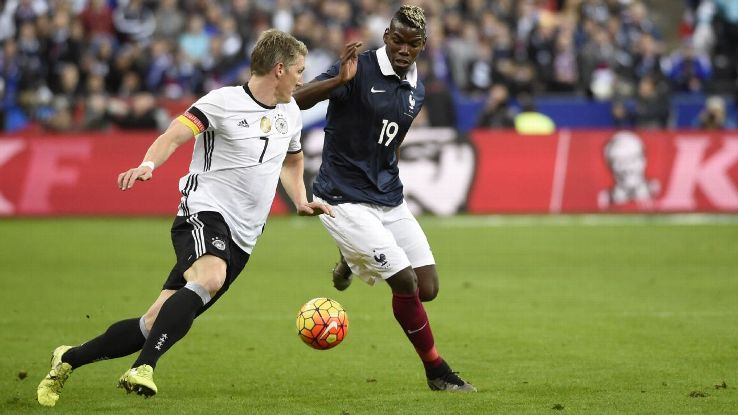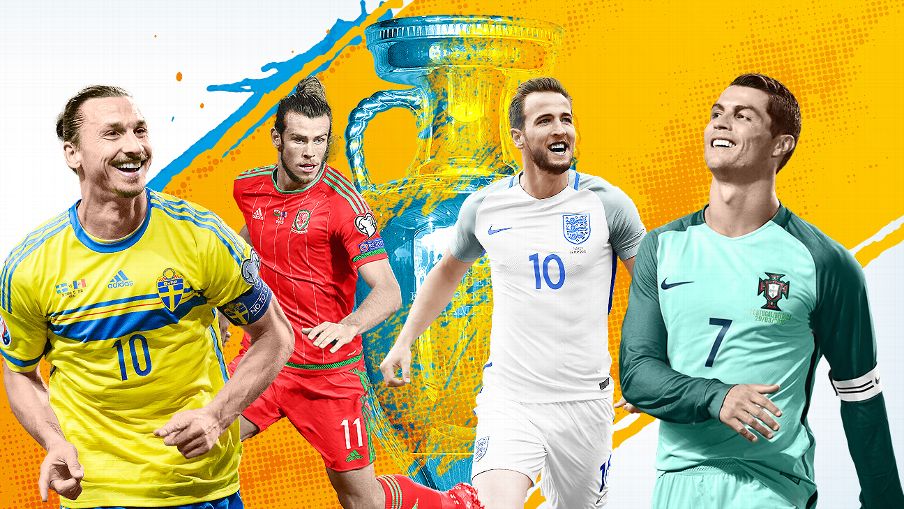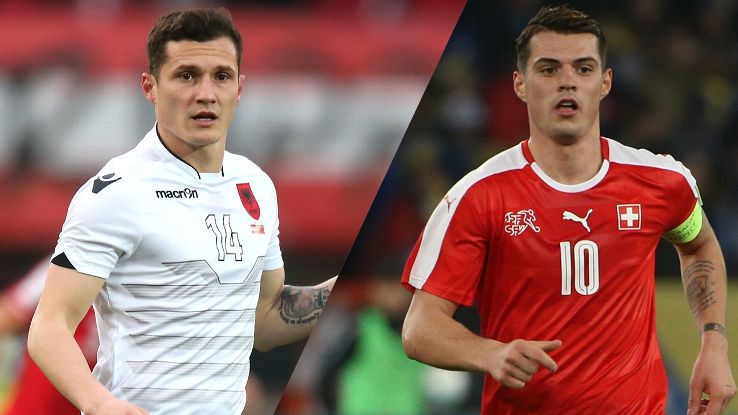- Joined
- Jul 14, 2008
- Messages
- 90,068
- Points
- 113
From espnfc.com
By Iain Macintosh
Euro 2016: The team and player that will unravel and other big predictions
Which superpower could really mess this up?
In 2014, Spain bravely held off the challenge of both England and Italy by exiting the World Cup, a tournament title they were supposed to be defending, inside just seven days. That will take some beating. All three of those nations still retain that special combination of banana-skin filled groups and pulsating potential uselessness.
But what about Germany? They've lost four of their last seven games. They weren't playing great sides, either, with defeats to Ireland, Slovakia and, most shamefully of all, England. It doesn't take a great leap of imagination to see them slipping up against Ukraine, Poland or even Northern Ireland.
Which team will be hated by the media in spite of their status?
Albania are the most Cinderella-ist of all the Cinderella stories at this summer's tournament, but there's every chance the world's media will loathe them. How could this be? They are so unfancied that they're under the underdogs. They're so plucky that when they get up from their sofa, they leave traces of pluck in the fibres.
But they harbour a dark and terrible secret. When they met Austria in a friendly earlier this year, they played in their second strip: white shirts. With white numbers. And white lettering. Madness. If they wear that shirt against Switzerland on June 11, it will be a nightmare for every journalist and commentator. Expect this to be reflected in the tone of the reports.
Who will have the shortest tournament?
England aren't going to win the big prize, but they've got this one locked down. Someone will get injured almost instantly. Remember how high your eyebrows rose when you discovered that poor Ledley King had been included in England's 2010 World Cup squad? Remember how he lasted barely two minutes in South Africa? It's going to happen again, isn't it?
England have only three centre-backs in the squad, so they're tempting fate on one count. They have Daniel Sturridge, so they're tempting fate on two counts. They have Jack Wilshere, and three counts should be more than enough. Wilshere, whose inclusion came after missing almost the entire season, and at the expense of Danny Drinkwater, has to be the favourite to tumble.
Which team will unravel mid-tournament?
With the Dutch watching on television, this prize is wide open. You'd be tempted to plump for France, given the pressure they'll be under as favourites and, more pertinently, their unrivalled capacity for chaos. But what about Portugal? We saw in 2014 what happens when Cristiano Ronaldo is held together by sticky tape and staples; he tries to win the game all on his own and the team suffers for it. If his heroics aren't enough, how long will it be before someone in a Portugal shirt breaks down and screams, "For the love of all that is holy, Cris. Let someone else take a free kick!"
Who will flip out and do something absolutely stunningly foolish?
When it comes to Grade A wobblies, you can never really rule out Zlatan Ibrahimovic. The big, mercurial Swede is a law unto himself. But this is probably his international swan song and he has a brand to protect now. A more likely barmpot is the cut-price Zlatan, Austria's Marko Arnautovic. Jose Mourinho once said that Arnautovic had "the attitude of a child," a conclusion aided by the former Inter Milan forward's decision to wear boots inscribed with the words, "Champions League Winner 2010," even though he wasn't in the victorious squad. He's been caught speeding, he's fought teammates, he's insulted entire cities, and last week, he was embroiled in a spitting scandal. The world waits for his next move.
Which fiery manager will soon be watching from the corporate box?
You'd always think that the managers to be sent from the touchline would be the most volatile men, but it doesn't always work like that. In 2008, it was the unassuming Joachim Low who found himself watching Germany's quarterfinal clash with Portugal from the posh seats after a spat with the Austrian manager Josef Hickersberger during their group stage match. Antonio Conte and Fatih Terim both seem to be the sort of chaps well capable of flipping out in the technical area. Then there's Ireland's Martin O'Neill. He might look unassumingly bookish, but there's a fire that dwells within that man. And if assistant manager Roy Keane eggs him on ...
Who will be England's penalty villain?
This is obviously happening. Even England can't mess up a group like that when three teams will probably progress to the knock-out stage. What do England do in knock-out stages? They lose on penalties. Or get obliterated by Germany. But mostly, it's penalties. It doesn't matter what you do, or how much you practice. England can't win penalty shoot-outs. They're like a cat with chopped whiskers, unable to walk through an open door. This is nature, people. And having tempted karma by discussing a move to Arsenal on the eve of the tournament, it's Jamie Vardy who will welly his spot-kick into the second tier.
By Iain Macintosh
Euro 2016: The team and player that will unravel and other big predictions
Which superpower could really mess this up?
In 2014, Spain bravely held off the challenge of both England and Italy by exiting the World Cup, a tournament title they were supposed to be defending, inside just seven days. That will take some beating. All three of those nations still retain that special combination of banana-skin filled groups and pulsating potential uselessness.
But what about Germany? They've lost four of their last seven games. They weren't playing great sides, either, with defeats to Ireland, Slovakia and, most shamefully of all, England. It doesn't take a great leap of imagination to see them slipping up against Ukraine, Poland or even Northern Ireland.
Which team will be hated by the media in spite of their status?
Albania are the most Cinderella-ist of all the Cinderella stories at this summer's tournament, but there's every chance the world's media will loathe them. How could this be? They are so unfancied that they're under the underdogs. They're so plucky that when they get up from their sofa, they leave traces of pluck in the fibres.
But they harbour a dark and terrible secret. When they met Austria in a friendly earlier this year, they played in their second strip: white shirts. With white numbers. And white lettering. Madness. If they wear that shirt against Switzerland on June 11, it will be a nightmare for every journalist and commentator. Expect this to be reflected in the tone of the reports.
Who will have the shortest tournament?
England aren't going to win the big prize, but they've got this one locked down. Someone will get injured almost instantly. Remember how high your eyebrows rose when you discovered that poor Ledley King had been included in England's 2010 World Cup squad? Remember how he lasted barely two minutes in South Africa? It's going to happen again, isn't it?
England have only three centre-backs in the squad, so they're tempting fate on one count. They have Daniel Sturridge, so they're tempting fate on two counts. They have Jack Wilshere, and three counts should be more than enough. Wilshere, whose inclusion came after missing almost the entire season, and at the expense of Danny Drinkwater, has to be the favourite to tumble.
Which team will unravel mid-tournament?
With the Dutch watching on television, this prize is wide open. You'd be tempted to plump for France, given the pressure they'll be under as favourites and, more pertinently, their unrivalled capacity for chaos. But what about Portugal? We saw in 2014 what happens when Cristiano Ronaldo is held together by sticky tape and staples; he tries to win the game all on his own and the team suffers for it. If his heroics aren't enough, how long will it be before someone in a Portugal shirt breaks down and screams, "For the love of all that is holy, Cris. Let someone else take a free kick!"
Who will flip out and do something absolutely stunningly foolish?
When it comes to Grade A wobblies, you can never really rule out Zlatan Ibrahimovic. The big, mercurial Swede is a law unto himself. But this is probably his international swan song and he has a brand to protect now. A more likely barmpot is the cut-price Zlatan, Austria's Marko Arnautovic. Jose Mourinho once said that Arnautovic had "the attitude of a child," a conclusion aided by the former Inter Milan forward's decision to wear boots inscribed with the words, "Champions League Winner 2010," even though he wasn't in the victorious squad. He's been caught speeding, he's fought teammates, he's insulted entire cities, and last week, he was embroiled in a spitting scandal. The world waits for his next move.
Which fiery manager will soon be watching from the corporate box?
You'd always think that the managers to be sent from the touchline would be the most volatile men, but it doesn't always work like that. In 2008, it was the unassuming Joachim Low who found himself watching Germany's quarterfinal clash with Portugal from the posh seats after a spat with the Austrian manager Josef Hickersberger during their group stage match. Antonio Conte and Fatih Terim both seem to be the sort of chaps well capable of flipping out in the technical area. Then there's Ireland's Martin O'Neill. He might look unassumingly bookish, but there's a fire that dwells within that man. And if assistant manager Roy Keane eggs him on ...
Who will be England's penalty villain?
This is obviously happening. Even England can't mess up a group like that when three teams will probably progress to the knock-out stage. What do England do in knock-out stages? They lose on penalties. Or get obliterated by Germany. But mostly, it's penalties. It doesn't matter what you do, or how much you practice. England can't win penalty shoot-outs. They're like a cat with chopped whiskers, unable to walk through an open door. This is nature, people. And having tempted karma by discussing a move to Arsenal on the eve of the tournament, it's Jamie Vardy who will welly his spot-kick into the second tier.







